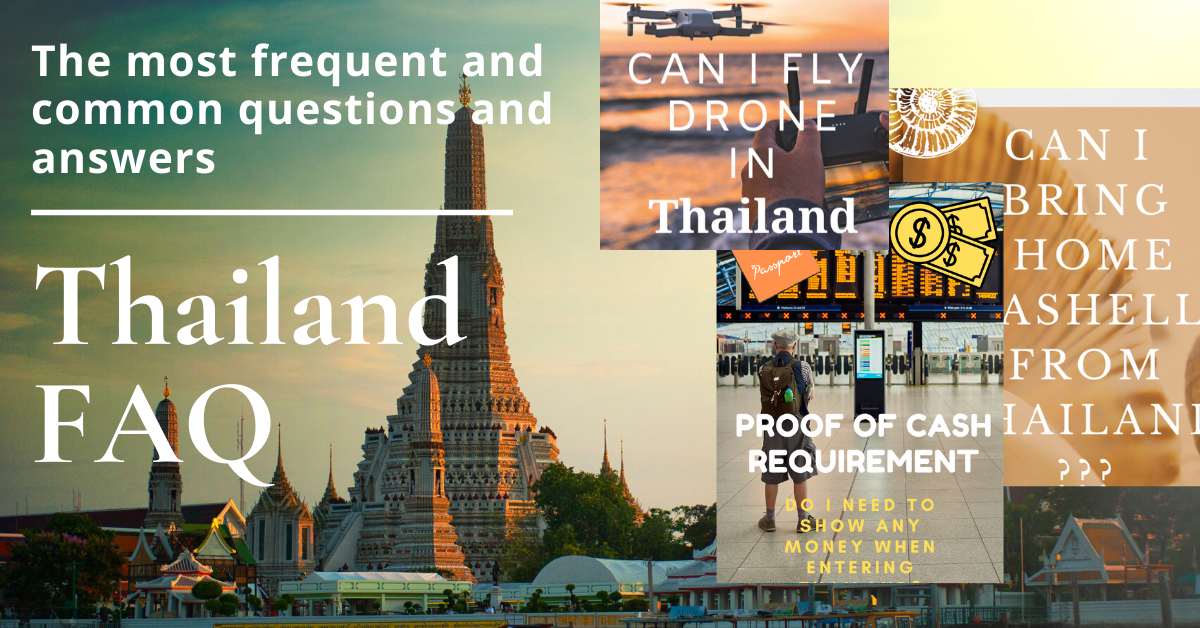FAQ
1 What is the best time for a holiday in Thailand?
 The best time for holiday in Thailand is in the dry and hot season, from mid-November till the end of April. The least amount of rain is in February and March with temperatures around 30°C (86°F). However, Thailand has warm and pleasant weather all year round and it is suitable for all year holidays.
The best time for holiday in Thailand is in the dry and hot season, from mid-November till the end of April. The least amount of rain is in February and March with temperatures around 30°C (86°F). However, Thailand has warm and pleasant weather all year round and it is suitable for all year holidays.
If you are financially and time-wise flexible and are looking for the time of the year with the least probability of rain or bad weather, I recommend you to plan your vacation in February or March. These two months have theoretically least chance of showers with minimal or no rainfall.
Of course, the weather is unpredictable and nobody can tell you for sure what the weather will be like next week or next month.
Even during the rainy season, Thailand is a popular destination for tourists from all over the world. Expect some rainfall, but monsoon showers do not last long. In southern Thailand, temperatures are still around 27-29 ℃ (80.6-84.2°F) during the day. The rainiest months are usually June and September.
READ ALL ABOUT THAILAND HERE: WHAT IS THE BEST TIME TO TRAVEL TO THAILAND
2 WHEN IS THE RAINY SEASON IN THAILAND?
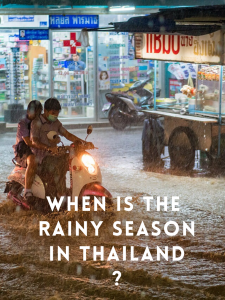 The rainy season in Thailand starts at the end of May and continues until October. The wettest months are usually June and September. The average temperatures are still between 27-32℃ (80.6-89.6°F). The amount of rainfall varies dramatically depending on the east of the west coast of Thailand.
The rainy season in Thailand starts at the end of May and continues until October. The wettest months are usually June and September. The average temperatures are still between 27-32℃ (80.6-89.6°F). The amount of rainfall varies dramatically depending on the east of the west coast of Thailand.
The weather in the tropical climate is unpredictable and nobody can predict the weather one hour ahead, let alone for the rest of the week. Monsoon showers are in most cases intense and fast, and mostly occur in the afternoons and overnight.
Apps and online weather forecasts in Thailand do not work and are not accurate. You don’t have to worry about wasting your time looking for Thailand weather forecasts online during your holidays. The weather app on the iPhone is completely incorrect most of the days. Almost every day shows rain or cloudy weather, even during the dry season, when the sky is blue for three months and does not rain at all.
3 DO I NEED TO SHOW ANY MONEY WHEN ENTERING THAILAND ?
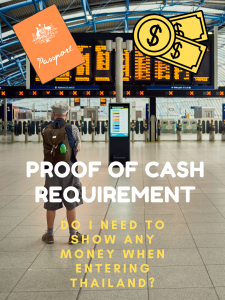 You might need to show sufficient funds for your holiday when coming to Thailand. Under the Thai Immigration Act from 19th February 2010, anyone entering Thailand can be asked to show PROOF OF CASH. When entering Thailand as a tourist with “VISA ON ARRIVAL” you might be asked to show 10,000 Baht (330USD) per person or 20,000 Baht per family (660USD). If you are entering on a tourist visa, you have to show 20,000 Baht per person or 40,000 Baht per family.
You might need to show sufficient funds for your holiday when coming to Thailand. Under the Thai Immigration Act from 19th February 2010, anyone entering Thailand can be asked to show PROOF OF CASH. When entering Thailand as a tourist with “VISA ON ARRIVAL” you might be asked to show 10,000 Baht (330USD) per person or 20,000 Baht per family (660USD). If you are entering on a tourist visa, you have to show 20,000 Baht per person or 40,000 Baht per family.
The immigration officials may require you to prove that you have sufficient funds for your vacation. The cash doesn’t have to be in the Thai bath, it can also be equivalent in your currency, dollars, or euros.
This applies to everyone entering the Kingdom of Thailand as a tourist. Cash must be on you at the point of entry. Do not rely on finding an ATM before the immigration check-in point.
In addition to cash, immigration officials can also randomly ask you to show your accommodation reservation- at least for the first few days of your vacation. And also for a return ticket from Thailand and your travel insurance.
If you fail to prove sufficient finances you may be refused entry into Thailand or get your visa canceled. Checks are at random and immigration officers can check anyone so just because they didn’t check 100 people in front you don’t mean they won’t check you.
4 DO I NEED AN INTERNATIONAL DRIVING LICENSE TO DRIVE IN THAILAND?
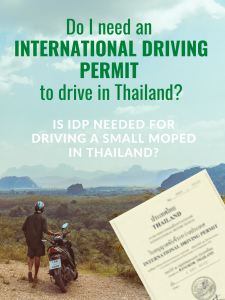 You must have a valid international driving permit IDP to be able to drive legally in Thailand. To drive small moped you will need international driving permit category A (small motorbike). If you don’t have a valid international driving permit you are not legally able to drive in Thailand.
You must have a valid international driving permit IDP to be able to drive legally in Thailand. To drive small moped you will need international driving permit category A (small motorbike). If you don’t have a valid international driving permit you are not legally able to drive in Thailand.
Motorcycle accidents are the most frequent cause of fatalities in Thailand and it is not advisable to drive without valid IDP.
In Thailand, only the “A” group is recognized for the motorbike, no subgroups are legally valid here. If you happen to be involved in a traffic accident and do not have an “A” international driving license, even if the accident is not your fault, you will find yourself in a lot of trouble. You will be obliged to pay all costs for damages and medical expenses, both for yourself and others involved.
If you drive illegally without a valid driving license, you will of course not be entitled to any payment from the insurance company.
As for renting a scooter without a proper driving license, in reality, most rental companies will lend you a motorcycle based on your passport even without a driver’s license. If you then want to risk and break the law in a foreign country, that would be your decision and responsibility.
5 What vaccination should I get before coming to Thailand?
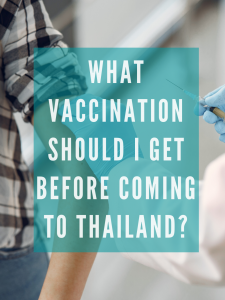 Recommendations for basic vaccination in Thailand include HEPATITIS type A + B and vaccination against TYPHOID FEVER. You should also check the validity of your TETANUS vaccination before traveling. The rest of the vaccination is dependent on the nature of your holiday, and sometimes RABIES vaccination can be also recommended.
Recommendations for basic vaccination in Thailand include HEPATITIS type A + B and vaccination against TYPHOID FEVER. You should also check the validity of your TETANUS vaccination before traveling. The rest of the vaccination is dependent on the nature of your holiday, and sometimes RABIES vaccination can be also recommended.
- Vaccinations against hepatitis type A can be vaccinated separately with two doses with a minimum interval of 6 months, protection is long-term. Vaccination is also possible with a combined vaccine against types A and B three doses (2 before departure), protection is long-term.
- Hepatitis type B may be vaccinated alone with three doses or with a combined vaccine against types A and B with three doses. After three doses, the protection is long-term, probably life-long.]
- Vaccination against typhoid fever is done with one vaccine that provides protection for 3 years. Revaccination is only performed when necessary.
The travel jabs are only a recommendation. Vaccination is not mandatory for entry to Thailand.
If you do need a visa prior to entering Thailand depends on your passport (nationality). Most countries are eligible to 30 days visa exemption (51 nations). If your country is on the exemption list and your vacation is not longer than 30 days (30 days, not a month), you will automatically get a 30-day permit to enter Thailand as a tourist.
Following passport holders can travel to Thailand visa-free:
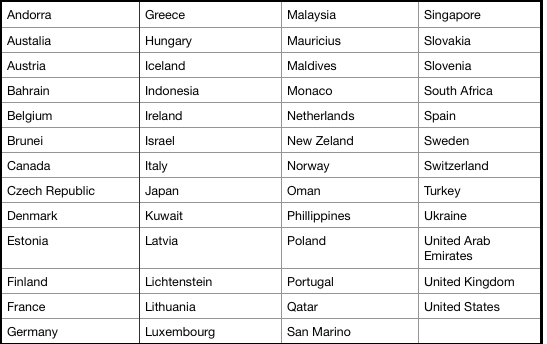
You will receive an “Arrival and Departure Card” on arrival or on board, which you must complete and hand in at passport control.
- If you plan to stay in Thailand longer than 30 days or your passport does not allow visa on arrival, you can apply for a tourist visa at the Thai Embassy in your country – “Single entry tourist VISA” (which can be extended for another 30 days at the Immigration Office in Thailand). Another option is the “Multiple entry tourist VISA” – a 60-day visa with the possibility of repeated entry, in which you can leave the country and return.
For those with visa on arrival, there is another option to extend your stay by leaving Thailand and visiting another country, such as Vietnam, Cambodia, or Malaysia. When you return to Thailand you will receive another 30-day Visa on Arrival stamp.
If you overstay your visa, you will pay a fine of THB 500 per day (minimum of THB 1,000 and a maximum of THB 20,000). In the event of a gross violation of the allowed period of stay, you may be placed in a detention center and deported, at your own expense. This can also result in a ban on entering Thailand for up to 10 years.
Also be aware of the validity of your passport, which must be valid for at least 6 months from the date of entry into the country.
7 Can I use IQOS electronic cigarettes in Thailand?
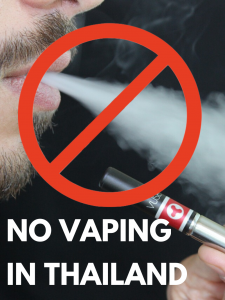 You can no use any electronic cigarettes in Thailand. IQOS and all other electronic cigarettes have been strictly banned from importing and exporting across Thai borders under the law since November 2014. Under the law, the import, export, and sale of cartridges are prohibited under a fine of up to THB 20,000 or ten years in prison.
You can no use any electronic cigarettes in Thailand. IQOS and all other electronic cigarettes have been strictly banned from importing and exporting across Thai borders under the law since November 2014. Under the law, the import, export, and sale of cartridges are prohibited under a fine of up to THB 20,000 or ten years in prison.
Tourists and Thais have been fined and/or arrested in many cases over the last few years.
8 Do u leave a tip in Thailand?
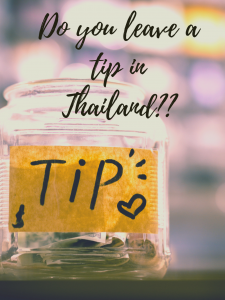 You do not have to leave a tip in Thailand. Leaving a tip is not mandatory in Thailand. The decision whether to leave a tip or not is entirely up to you. It is not expected or enforced in Thailand however a small tip is always welcomed and a kind gesture.
You do not have to leave a tip in Thailand. Leaving a tip is not mandatory in Thailand. The decision whether to leave a tip or not is entirely up to you. It is not expected or enforced in Thailand however a small tip is always welcomed and a kind gesture.
If you liked the food or was happy with a good service, a small tip will be appreciated. I leave tips often we travel with my husband in Thailand.
At the restaurant, you can leave a tip of approximately 10% to 15% of your bill.
If you want to give a tip, for example in a hotel or to a driver, boat captain, etc., it is advisable to give a banknote – for example, 100THB. Do not give anyone any coins or 20THB bill, this would be considered more of a joke or insult.
9 Can I bring home seashells from Thailand?
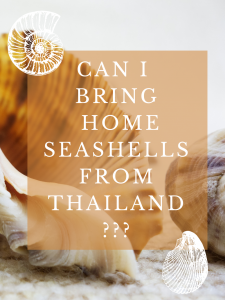 You are not allowed to export any seashells, corals, bones, dried butterflies, skulls, teeth, tiger claws, and other “souvenirs” from Thailand. The prohibited category includes not only shells and corals from the sea, but also those that washed up the sea, or which have already been processed into a souvenir.
You are not allowed to export any seashells, corals, bones, dried butterflies, skulls, teeth, tiger claws, and other “souvenirs” from Thailand. The prohibited category includes not only shells and corals from the sea, but also those that washed up the sea, or which have already been processed into a souvenir.
According to the Customs Regulations of most countries, it is illegal to import souvenirs from your holiday that violate applicable international regulations and may not be imported without the necessary documents. Many of these souvenirs are protected specimens of endangered animal and plant species that are protected by CITES. If the passenger does not have the necessary documents for the imported specimens, they are subsequently seized and the case is further investigated by the Environmental Inspectorate. These violations can result in hefty fines and even imprisonment. Prohibited items also include food supplements that contain parts of protected plants and animals.
You can get into trouble already in Thailand, before even entering the customs. There are park angers in the areas of national parks, who are legally entitled to impose penalties on anyone who damages or removes corals or shells from the sea.
Besides being it illegal, there is no reason to collect and remove shells or pebbles from the beach. If every tourist visiting the beach took something home there won’t be much left. Let’s protect the environment.
10 Should I exchange money before going to Thailand?
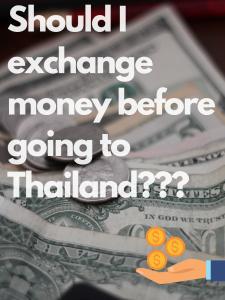 It is best to wait to exchange your money once you arrive in Thailand.
It is best to wait to exchange your money once you arrive in Thailand.
- There are exchange shops everywhere so you can change easily your currency once you arrive in Thailand.
- You can change up at the airport or anywhere in the town or your final destination.
- The best exchange rate at Bangkok Suvarnabhumi airport is usually in the basement at the SuperRich exchange office.
Also, there are cashpoint machines- ATMs almost everywhere. When withdrawing from ATM in Thailand there is a fee of 220THB per transaction.
Note that on islands might not be as good exchange rate as on the mainland.
If you are from a smaller country with not so common currency you can change up in your country for USD or Euros and then change to Thai Baht once you arrive in Thailand.
11 how to protect yourself from mosquitoes in Thailand?
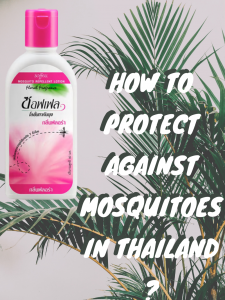 The best mosquito protection in Thailand is Thai repellent SOFFELL (ซอ ฟ เฟล). It is available both as a cream and as a spray. You can buy it in any supermarket, 7-Eleven, Tesco Lotus, in pharmacies, etc. It costs around 60-70 THB. You can also buy and carry with you an electric plug repellent and use it in your hotel room.
The best mosquito protection in Thailand is Thai repellent SOFFELL (ซอ ฟ เฟล). It is available both as a cream and as a spray. You can buy it in any supermarket, 7-Eleven, Tesco Lotus, in pharmacies, etc. It costs around 60-70 THB. You can also buy and carry with you an electric plug repellent and use it in your hotel room.
Thailand is located in a tropical climate zone and mosquitos are here all year round. Some people attract mosquitoes more than others.
It is important to protect yourself, especially during the rainy season when mosquitoes are breeding and you will also need extra protection if you are planning a jungle trek.
12 Do I need travel insurance to visit Thailand??
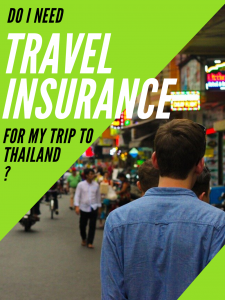 Travel insurance is an absolute must if you are traveling to Thailand (or anywhere else abroad). You don’t know what can happen during your vacation and going to Thailand or anywhere else abroad without travel insurance would not be wise. Proof of travel insurance may also be required of you when entering Thailand.
Travel insurance is an absolute must if you are traveling to Thailand (or anywhere else abroad). You don’t know what can happen during your vacation and going to Thailand or anywhere else abroad without travel insurance would not be wise. Proof of travel insurance may also be required of you when entering Thailand.
You can check our World Nomads travel insurance for an instant quote and great deals. Apart from getting health insurance, you can also have your equipment insured against theft. That can come handy if you carry electronics such as an expensive camera, phone, or laptop.
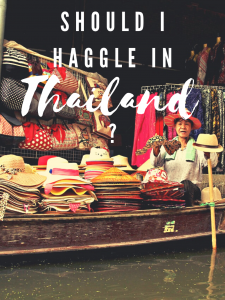 You can haggle in Thailand, but with some common sense and respect for the seller. Bargaining is mostly practiced in the local markets and in street stalls with clothing and souvenirs. Do NOT bargain in the proper shops, restaurants, and stalls with food or bars, where there are fixed prices.
You can haggle in Thailand, but with some common sense and respect for the seller. Bargaining is mostly practiced in the local markets and in street stalls with clothing and souvenirs. Do NOT bargain in the proper shops, restaurants, and stalls with food or bars, where there are fixed prices.
I have read several times on the internet that you have to bargain in Thailand and if you don’t, you can even offend the local seller. I do not think that any seller would be offended if you give him or her the first price they asked for:)
If the seller agrees to discount, then you can decide if you like the price and want to make the purchase, don’t ask for another additional discount after you already got an offer. If you are not happy with the price then say thank you and walk away. I often hear foreigners asking for a ridiculously low price, which is embarrassing.
For example, if a retailer asks for a 500THB T-shirt, then you have a good chance of getting it for 300THB.
14 Can i fly drone in Thailand?
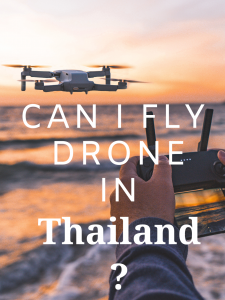 You can fly a drone in Thailand however, the regulations and obtaining the permit are time-consuming and financially demanding. It is not a simple and inexpensive process. It’s only worth to someone who is going on a long-term trip to Thailand and is not financially and time-wise limited.
You can fly a drone in Thailand however, the regulations and obtaining the permit are time-consuming and financially demanding. It is not a simple and inexpensive process. It’s only worth to someone who is going on a long-term trip to Thailand and is not financially and time-wise limited.
Since 2019, it is not possible to register a drone at a police station and if you want to legally fly in Thailand, you must obtain four documents:
- Registration of the drone with the CAAT (Civil Aviation Authority of Thailand).
- Registration of the drone on NBTS (National Broadcasting Telecommunications).
- Drone Insurance.
- Temporary drone import license (this document is not needed if you purchased the drone in Thailand).
The exact step-by-step description of how to proceed with registration can be found HERE.
According to the Thai National Aviation Authority, the Thai Civil Aviation Authority (CAAT), you must comply with and follow the drone regulations below:
- All drones must be registered if 1) they have a camera and 2) weigh 2 kilograms or more.
- Drones weighing more than 25 kilograms must be registered with the Ministry of Transport.
- Drone operators must maintain visual surveillance with the drone at all times.
- Drones shall not fly close to an aeronautical area (airport, helipad, etc.)
- Drones shall not fly horizontally close to any person, vehicle, structure or buildings less than 30 meters away.
- Drones must not fly in enclosed spaces without permission.
- Drones may not fly within 9 km of an aerodrome or temporary aerodrome, except for a special permit.
- Drones must not fly higher than 90 meters.
A ban on flying without a special permit is also in the center of Bangkok and in most national marine parks. If you bring your drone to Thailand without NBTC registration, you may be fined BTH 100,000 (3,150USD or 2,769EURO). It may sound strict, but there is also possible imprisonment for up to five years.
The penalty for flying a drone in Thailand without a CAAT registration is THB 40,000 (US $ 1,258 or the US $ 1,106) and possible imprisonment for one year.
The Thai authorities have got lately much stricter and control drone forums and Facebook groups with drone videos that break the rules. The authors of these videos can be then blacklisted and banned from entering the country, or their drones are removed prior to entry.
15 Should I pre-book my accommodation in Thailand?
 It is not necessary to pre-book your accommodation in Thailand. However, do not forget that at the airport when entering Thailand you may be asked to show the hotel reservation and you will also need to provide an address on your arrival card. It makes sense to book a hotel for at least the first couple of days.
It is not necessary to pre-book your accommodation in Thailand. However, do not forget that at the airport when entering Thailand you may be asked to show the hotel reservation and you will also need to provide an address on your arrival card. It makes sense to book a hotel for at least the first couple of days.
There are four cases where you should make a hotel reservation ahead of your trip. These cases are:
- You have a fixed travel plan and you know exactly what hotel you want to be staying at.
- You are staying on a small island or location with limited accommodation.
- You are traveling in peak season, from December till the end of February.
- You are traveling during holidays- Christmas, New Year, Thailand’s New Year ( 13th April), Chinese New Year (beginning of February), and Loy Kratong Festival (mid-November).
If you know the dates of your vacation and you have purchased flight tickets, I see no reason not to book your accommodation.The sooner you start to research your ideal hotel, the better. You will have a wider choice and this applies mainly to popular tourist destinations and smaller islands.
If you are traveling out of season and do not want to plan your vacation day by day, you can find your hotel once you arrive.
16 Can I buy SIM card with internet data in Thailand?
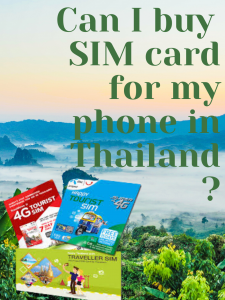 You can buy easily a SIM card for your phone at the airport, any 7/11 or local phone shops. Mobile SIM cards in Thailand are very cheap and get activated within minutes. For about 400THB ($12) you can purchase 4GB of mobile data for 30 days. The most common operators are True Move, Dtac, or AIS.
You can buy easily a SIM card for your phone at the airport, any 7/11 or local phone shops. Mobile SIM cards in Thailand are very cheap and get activated within minutes. For about 400THB ($12) you can purchase 4GB of mobile data for 30 days. The most common operators are True Move, Dtac, or AIS.
Wherever you are in the city and on islands, you can buy a Thai SIM card in the 7/11 store or in a store with phones and various stalls. To purchase a SIM card you will need your passport to register.
The best way is to download the application to your mobile and choose the online package you want. Also, you can ask for help at the stand or shop where you buy the card. Choose one of the tariffs according to the price list and ask to change your SIM card in your mobile phone and activate it. You can also buy the SIM card directly at the airport. Prices and package types are constantly changing so it is best to choose the tariff from the current offer, once you arrive in Thailand.
17 Can I bring any alcohol or cigarettes to Thailand?
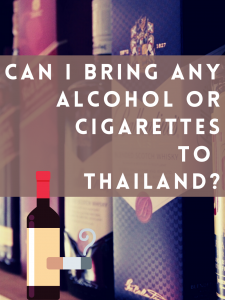 You can bring a maximum of one liter of spirit, liqueur, or wine per person to Thailand. And a maximum of 200 cigarettes, or 250g of tobacco (cigars), or combined tobacco products weighing up to 250g.
You can bring a maximum of one liter of spirit, liqueur, or wine per person to Thailand. And a maximum of 200 cigarettes, or 250g of tobacco (cigars), or combined tobacco products weighing up to 250g.
18 Do I have to carry my passport with me in Thailand?
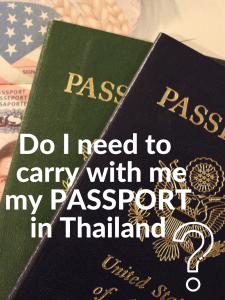 By law, you are obligated to carry with you your passport all the time in Thailand. Before traveling, check that your passport is valid for at least six months after entering Thailand. Make sure your passport also has one blank page, as this is necessary to enter the country.
By law, you are obligated to carry with you your passport all the time in Thailand. Before traveling, check that your passport is valid for at least six months after entering Thailand. Make sure your passport also has one blank page, as this is necessary to enter the country.
I also recommend scanning on your phone or copying any important documents including your passport, travel insurance, and driving license. It is safe to have copies in case you lose anything important.
It is very unlikely that you will be checked on the beach for your passport however if you do not have your proof of identification you can be arrested.
19 What is the fee and withdrawal limit for ATMs in Thailand?
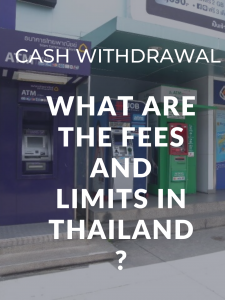 ATM withdrawal fee in Thailand is currently 220THB. The maximum withdrawal value is different in each bank, the most common limit is 20,000 THB per day. Krungsi Yellow Bank has a higher limit of 30,000 THB. Pay attention when withdrawing cash. In Thailand, the cash comes out first, then followed by the card. Don’t put your money in the pocket and walk away from ATM without your bank card.
ATM withdrawal fee in Thailand is currently 220THB. The maximum withdrawal value is different in each bank, the most common limit is 20,000 THB per day. Krungsi Yellow Bank has a higher limit of 30,000 THB. Pay attention when withdrawing cash. In Thailand, the cash comes out first, then followed by the card. Don’t put your money in the pocket and walk away from ATM without your bank card.
You can also make a withdrawal from your account inside of the bank with your passport and bank card. Do not forget to notify your bank about your travel abroad.
I recommend using ATMs outside of the bank (if there is a bank where you are located). In case the card gets accidentally stuck inside or there is any problem, the bank staff can help you.
20 Can I travel to Thailand if I don't speak English?
 You don’t need to speak English or Thai to be able to enjoy holidays or backpacking in Thailand. If you have some basic English it will help but it is not completely necessary. Buy a tourist SIM card with data as soon as you arrive so you will have access to the internet and be able to use online apps, translators, and Google maps.
You don’t need to speak English or Thai to be able to enjoy holidays or backpacking in Thailand. If you have some basic English it will help but it is not completely necessary. Buy a tourist SIM card with data as soon as you arrive so you will have access to the internet and be able to use online apps, translators, and Google maps.
If your language skills are not up to scratch, I recommend that you print out all bookings, tickets, transfers, etc., which you can then show at the airport, ferry port, or to the taxi driver. You can book all your accommodation ahead online in your language so you won’t have to deal with that in Thailand.
21 How to get rid of an upset stomach in Thailand?
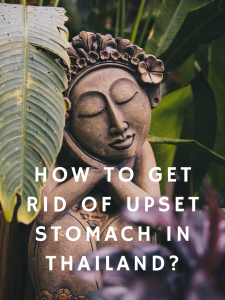 To get rid of an upset stomach in Thailand do the following:
To get rid of an upset stomach in Thailand do the following:
- Go to the first pharmacy (which is on every corner) and explain to the pharmacist your situation. They will give you good medication for diarrhea or vomiting without any prescription.
- Keep hydrated and replenish lost fluids. You can buy “Electrolyte” and “OREDA” to replenish minerals in any pharmacy or any 7/11. Fresh coconut water also helps to rehydrate.
- If diarrhea lasts more than 48 hours and your condition is not getting better, go to the clinic or hospital.
It is not good to underestimate anything and health services are of a very good standard in Thailand. The clinic will contact your insurance company immediately to provide treatment and medication.
Stomach problems are very common for foreigners in Asia, so the pharmacist will know exactly what to give you. The vast majority of pharmacists speak perfect English. If you have problems communicating in English, you can say or show these words- “rok thong ruang” (โรค ท้องร่วง) = diarrhea and “ua” (อ้วก) = vomiting.
There are four basic rules to follow in regards prevention from getting Thai belly:
1. Drink only bottled water and use it to brush your teeth also.
2. Eat thoroughly cooked food, cooked meat, fish, etc.
3. Wash hands thoroughly and use an antibacterial gel.
4. Take probiotics before and during your holiday. The composition of probiotics protects your digestive tract from dangerous bacteria.
22 Should I leave my passport as a deposit when renting a scooter in Thailand?
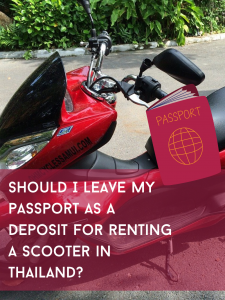 Do not leave your passport with a motorbike rental company in Thailand. By law, you are obligated to carry with you your passport all the time in Thailand. If the rental company requires you to deposit your passport, then offer a cash deposit instead. Around 5,000THB should be sufficient and a copy of your passport (in the case of renting a car around 10,000-20,000THB).
Do not leave your passport with a motorbike rental company in Thailand. By law, you are obligated to carry with you your passport all the time in Thailand. If the rental company requires you to deposit your passport, then offer a cash deposit instead. Around 5,000THB should be sufficient and a copy of your passport (in the case of renting a car around 10,000-20,000THB).
If the rental company doesn’t agree with the cash deposit then simply go somewhere else. Another good option is to rent a motorbike thought your hotel or hostel. They have copies of all your documents already from check-in so it shouldn’t be any problem renting a moped thought them.
Before renting a motorbike (and this also applies to jet skies or anything else you rent) take detailed photos of the scooter from all sides and point out any scratches, damaged paint, etc.
It is good to document everything or write any scratches, etc., on the paper or the rental agreement and have it signed. There are some well-known scams in Thailand which involve the rental company demanding payment for already existed damages, claiming it was you.
23 Is it safe to drive in Thailand?
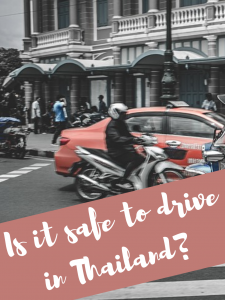 Driving in Thailand is not particularly safe and you have to pay 100% attention while driving. Do not drive a motorcycle in Thailand if you have any doubts about your driving skills. Even an experienced driver will find driving and traffic in Thailand very challenging. Do not forget to check the condition of the tires before driving and do not forget to wear a helmet.
Driving in Thailand is not particularly safe and you have to pay 100% attention while driving. Do not drive a motorcycle in Thailand if you have any doubts about your driving skills. Even an experienced driver will find driving and traffic in Thailand very challenging. Do not forget to check the condition of the tires before driving and do not forget to wear a helmet.
Watch out for bends where there may be windblown sand from the beach and gravel.
Many irresponsible drivers on the roads do not follow any rules and can cause a car accident very easily. I have seen a few accidents with my own eyes and it is not a pleasant sight. Thailand has been at the top of the list of the most fatal road accidents in the world for many years, so it is certainly not good to underestimate driving in Thailand.
When driving, be extra careful, and concentrate fully throughout the ride. Islands Koh Tao and Koh Chang are well known for their narrow curvy roads and especially after the rain, roads on these islands can be very dangerous.
Appropriate clothing is also important. Be sure not to ride a motorcycle in a swimsuit. Firstly it is inappropriate and secondly, you will end up burning off the skin if you accidentally fall off the bike. Nobody expects you to wear a professional motorcycle suit, but appropriate clothing which also helps you not to get sunburned is essential.
Driving motorbike in Thailand is subject to a valid Group A international driving license (see #4).
If you are unsure about driving a scooter, then you will be better off using a car or using public transport/grab, tuk-tuk, etc. Financially it will work out more expensive, but no money is worth the risk of your health or life and unnecessary stress during your vacation.
There is zero alcohol or drug tolerance in Thailand.
Renting a motorbike or car is a huge advantage in Thailand. Having your own mean of transport will give you the freedom and the chance to explore areas you might not otherwise ever come across. You will discover beautiful beaches, fishing villages, and secret viewpoints.
Did you not found out what you were looking for? Please contact us and we will be more then happy to answer your questions.


